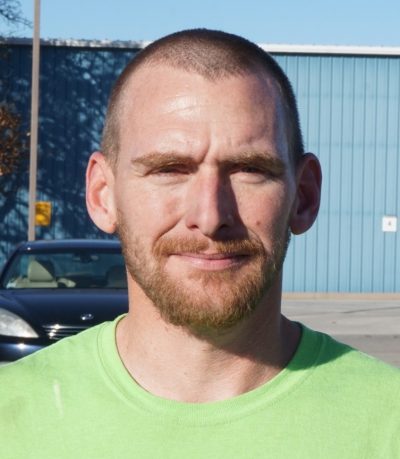Amid Opioid Crisis, Arkansas VA Tries
New Pain Treatment Options
By Alex Nicoll
Dustin Thompson, 39, served in the U.S. Army for seven years, is suffering from chronic pain. How the Veterans Health Administration treats that pain, though opioids or other methods, is a source of ongoing controversy.
Thompson shattered his femur and has a metal rod in his leg now, but when the weather changes, the rod will expand in his leg, which causes pressure on his bones and puts him in agonizing pain, he said.
Doctors would not prescribe him Tramadol or another pain reliever because he is already prescribed Ambien to help him sleep due to his struggles with post traumatic stress disorder, he said. There’s “not a chance in hell” that they would prescribe him pain relief medicine, he said.
“I can either sleep or be pain-free, but I can’t be both,” Thompson said.

Dustin Thompson, who served seven years in the U.S. Army, said his VA doctors are reluctant to prescribe new pain medication. Photo by Alex Nicoll
Thompson doesn’t have a gripe with his doctors at the Veteran Health Care System of the Ozarks, the Fayetteville VA complex. His complaint is with the VA system in general.
“The people are great. It’s the policies they enact that aren’t great,” Thompson said.
The issue of opioid use along with other medication is something the VA system is trying to reduce overall and is not just Fayetteville specific, Mark Worley, the Fayetteville VA Medical Center’s chief of staff, said.
Worley and the rest of the Fayetteville VA hospital staff are trying to help veterans reduce their dependency on opioids. It’s a gradual process because the body can’t be cut off from the drugs that abruptly, Worley said.
Upon arriving at the Fayetteville VA hospital in 2012, Worley said one of his first assignments was to reduce the hospital’s opioid prescriptions to veterans.
“We were prescribing way outside what other VAs were doing,” Worley said. “Since that period of time, we’ve decreased our opioid use by 90 percent, but it’s been very gradually over that period of time.”
Instead of opioids, Worley and his staff have promoted alternative forms of pain management. For example, the best treatment for chronic back pain is physical therapy and yoga, Worley said.
“Increasing flexibility, increasing core strength makes more difference in back pain than any drugs we throw at it,” Worley said.
Worley said his goal is not elimination of pain but to increase body function. He knows he has veterans who are upset with him and the VA but the medical staff has relied more on evidence-based therapy to see what will actually help than rely on traditional medicine which is more anecdotally driven, he said.
“Are they happy with us? No,” Worley said. “I could make them happy. I could just give them a bunch of opiates and say, ‘Hey, go with it.’”
Worley said that people who are on chronic opioid pain medication have a lower threshold for pain, which makes them more sensitive to pain. He said this only takes a couple of weeks before someone would need to have a higher dose prescribed to them.
Acute pain cases, such as injuries sustained from a car accident, opioids could “make all the difference in the world,” Worley said. However, physicians need to wean patients off the drugs a week after they are administered, he said.